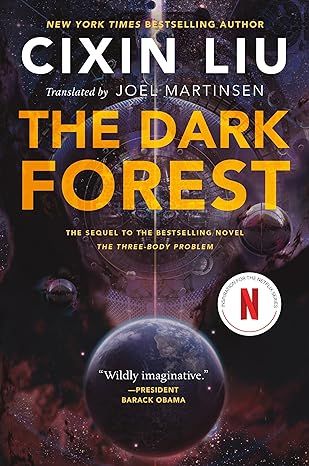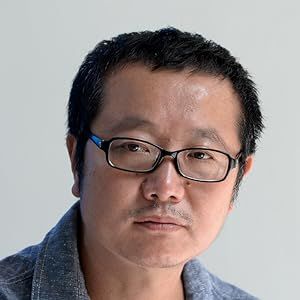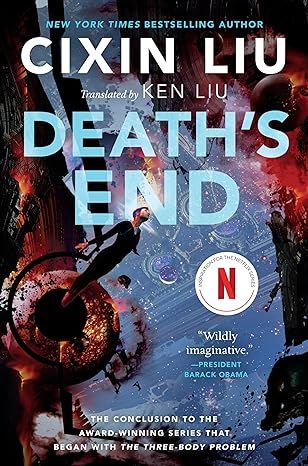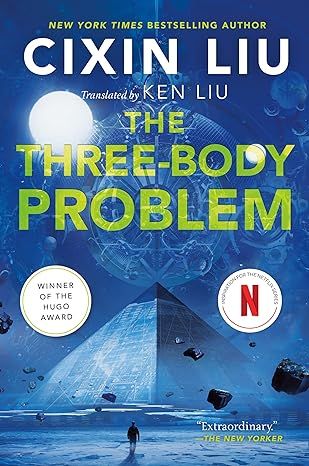
The Dark Forest (The Three-Body Problem Series, 2)
4.6 out of 5
28,684 global ratings
The inspiration for the Netflix series 3 Body Problem!
Over 1 million copies of the Three-Body Problem series sold in North America
PRAISE FOR THE THREE-BODY PROBLEM SERIES: “A mind-bending epic.”―The New York Times • “War of the Worlds for the 21st century.”―The Wall Street Journal • “Fascinating.”―TIME • “Extraordinary.”―The New Yorker • “Wildly imaginative.”―Barack Obama • “Provocative.”―Slate • “A breakthrough book.”―George R. R. Martin • “Impossible to put down.”―GQ • “Absolutely mind-unfolding.”―NPR • “You should be reading Liu Cixin.”―The Washington Post
The Dark Forest is the second novel in the groundbreaking, Hugo Award-winning series from China's most beloved science fiction author, Cixin Liu.
In The Dark Forest, Earth is reeling from the revelation of a coming alien invasion-in just four centuries' time. The aliens' human collaborators may have been defeated, but the presence of the sophons, the subatomic particles that allow Trisolaris instant access to all human information, means that Earth's defense plans are totally exposed to the enemy. Only the human mind remains a secret. This is the motivation for the Wallfacer Project, a daring plan that grants four men enormous resources to design secret strategies, hidden through deceit and misdirection from Earth and Trisolaris alike. Three of the Wallfacers are influential statesmen and scientists, but the fourth is a total unknown. Luo Ji, an unambitious Chinese astronomer and sociologist, is baffled by his new status. All he knows is that he's the one Wallfacer that Trisolaris wants dead.
The Three-Body Problem Series
- The Three-Body Problem
- The Dark Forest
- Death's End
Other Books by Cixin Liu
- Ball Lightning
- Supernova Era
- To Hold Up the Sky
- The Wandering Earth
- A View from the Stars
About the authors
Cixin Liu
Liu Cixin, born in June 1963, is a representative of the new generation of Chinese science fiction authors and recognized as a leading voice in Chinese science fiction. He was awarded the China Galaxy Science Fiction Award for eight consecutive years, from 1999 to 2006 and again in 2010. His representative work The Three-body Problem is the BEST STORY of 2015 Hugo Awards, the 3rd of 2015 Campbell Award finalists, and nominee of 2015 Nebulas Award. His works have received wide acclaim on account of their powerful atmosphere and brilliant imagination. Liu Cixin's stories successfully combine the exceedingly ephemeral with hard reality, all the while focussing on revealing the essence and aesthetics of science. He has endeavoured to create a distinctly Chinese style of science fiction. Liu Cixin is a member of the China Writers' Association and the Shanxi Writers' Association.
Read more
Reviews
Josh Mauthe
5
Even more epic and compelling than its predecessor
Reviewed in the United States on December 18, 2018
Verified Purchase
It's hard to know where to begin talking about The Three-Body Problem trilogy (officially known as the Remembrance of Earth's Past series), a truly staggering piece of science-fiction written by Chinese author Cixin Liu and translated to English by Ken Liu and Joel Martinsen (Liu did books 1 and 3, while Martinsen did 2). A trilogy that spans literally thousands of years, deals with quantum physics, game theory, sociology, religion, space exploration, space colonization, and more, all driven by the nature of first contact with alien intelligence - there's a lot going on in this series, and that's before you start realizing just how much Cixin (reminder: Chinese names are traditionally written with the family name first and the given name second) truly takes on the advanced science of his ideas. And yet, when you finish it, you realize that you've read something truly incredible - a piece of hard science-fiction whose ambition, scope, richness, and ideas are impossible not to find yourself thinking about for days afterward.
Once you read The Dark Forest, the series' second volume, Cixin's ambition for this saga starts to come into focus. The question of first contact is settled, and the nature of the alien's approach is known: this is to be a takeover of our planet. But how can we deal with a race so much more advanced than our own, constant surveillance by extra-dimensional forces, and fractured elements of humanity working against us?
If The Three-Body Problem was a first contact novel done as hard science-fiction, The Dark Forest is an alien invasion novel, albeit one in which the actual invasion is still many, many years away. It's the first time Cixin starts using hibernation to leap through decades and even centuries, spanning huge chunks of time as humanity changes and evolves in the face of an arrival which will change everything. As humanity struggles to find ways to either defend itself or show that it means no harm, the race has to deal with its own fears of inevitable defeat or a desire to retreat from the only planet we've ever known.
It's not as if The Three-Body Problem wasn't already ambitious, but The Dark Forest is on a whole other level, dealing with interplanetary fleets, lightspeed travel, quantum computing, and more, watching as they evolve over huge swaths of time. But more than that, the novel is a deeply philosophical one, discussing the nature of life in the universe, questions about human nature and how we react in the face of threats, how we work together (or not), and game theory in how we try to handle uncertain intentions in allies and foes alike. Indeed, the central metaphor that gives the book its title (which doesn't arrive until near the novel's end) is a stunning one that helps you understand that what Cixin is writing about isn't just this particular alien invasion, but about the nature of all life in the universe and how we attempt to define ourselves in the face of reality.
That Cixin does this while, again, mixing in such a compelling story (focusing especially on the "Wallfacers", a small group of people tasked with covertly planning humanity's resistance against the invasion) is nothing short of remarkable. The Dark Forest builds beautifully off of the questions and ideas raised in The Three-Body Problem, but turns them into something else entirely, changing the questions from "how do we initially react" to "how would we redefine ourselves in the face of such news". Far from suffering from any sort of "middle book syndrome," The Dark Forest is incredible, engaging with incredible concepts but never neglecting the human characters that anchor its massive scope nor the ticking clock at its story's core.
To explain this series is a difficult challenge, to put it mildly. This is a series that spans a huge amount of time, deals with advanced scientific concepts in complex terms, grapples with rich philosophical and political ideas, debates questions without easy answers, and gives you a scope that can be daunting. It's a story of alien invasions, yes, but one in which the action sequences we're so used to are replaced with existential dread, a rethinking of our own lives, and a fear of the unknown that's hard to quantify. It's also the story of people caught up in these times, trying to give themselves a good life while never forgetting the larger questions of their era, and juggling their own fears with fears for humanity. In other words, it's what hard science-fiction is great at - thoughtful questions, big ideas, and speculation, all of which change the way you think about the world.
This series is a truly incredible achievement, one that honestly left me a bit staggered and reeling as I attempt to think about it all, but one that I love all the more for what it accomplishes. If you're a hard science-fiction fan, or simply someone who loves dealing with the complex ramifications of common ideas, this is a must read series. I've never read anything like it in my life, and I'm a richer person for the ideas it's inspired me to think about.
Read more
152 people found this helpful
Jay B
5
massive amount of sci-fi innovation. too much?
Reviewed in the United States on November 23, 2023
Verified Purchase
I’m torn between giving the 4.5 or 5 stars. On one hand, the level of thought innovation in this book is atmospheric. The story strides through eons, societies, and cultures with strength. The clever technology, plot, philosophical and strategic twists & turns are mind blowing. They merit a solid 5 stars.
Yet, I’m left partly perplexed. This is SO vast and sweeping that I experienced two emotions while reading it. First, I grew slightly weary of the expanse of it. The reader must keep an enormous amount about what’s happening in their brain whilst still integrating more. I felt nearly overwhelmed in the process. Second, the sweep of story is so vast that the number of characters required to tell it is huge. (The author provides a large dramatis personae up front, maybe in recognition of the assistance a reader will need.) I had to refresh my recollection more than once.
These things make me want to pull a half a star off my rating. Yet, it’s compelling enough that I won’t do that in the whole-star options presented by Amazon & Goodreads. (It’ll be nice to use a 1/4 or 1/2 star option at TheStoryGraph.)
For the record, the book also has two aspects that sadden me. There is a certain fatalism that is clearly wrought through much of the book. I won’t spoil the info about whether it’s resolved positively or not. But it is sad, because my Christian stance in life - hard, and logically forged - brings a different view to my life, and I’m saddened for people who feel that life is empty & meaningless.
In a second, related aspect, the author incorporates a little bit of religion and a treatment of God alongside a purely secular (as well as Chinese-rooted) orientation of the story. In the process he almost (almost) paints the people with God beliefs as the ones who may have hope that can free them from the despair of fatalism. Sadly, while he gave this some space, he didn’t have the desire or faculties to develop it, so it’s hard to conclude if he is respecting or ridiculing them.
I was ambivalent about Book 1. Book 2 is compelling. In to Book 3. (Thanks Chris B for encouraging me to press thru to #2.)
Read more
23 people found this helpful
Sheraz Choudhary
5
A slow but worthy read
Reviewed in the United States on April 25, 2024
Verified Purchase
The book is slow at times and could potentially use some editing to decrease redundancy and shorten the length. But I am rating it a 5 because the uniqueness, concepts explored and ending are so different and thought provoking. The last quarter of the book is better paced and amazing!
6 people found this helpful
Selcuk
5
A Marvelous Sequel that Expands the Horizons of Science Fiction
Reviewed in the United States on May 19, 2024
Verified Purchase
Having just completed “The Dark Forest,��” the second installment of the Three-Body series, I am thoroughly impressed. This book is a remarkable sequel to an already successful first book. It brilliantly builds on the foundation laid by its predecessor, delving deeper into the complexities of alien life and the profound possibilities it presents. The narrative is thought-provoking and compelling, pushing the boundaries of our imagination. Liu Cixin has crafted a masterpiece that not only entertains but also enhances our thinking about the universe and our place within it. Highly recommended for all science fiction enthusiasts! The ending is especially surprising :))
Read more
JJH
4
So different and so good!
Reviewed in the United States on April 14, 2024
Verified Purchase
I do love the feel of this series. It's very... familiar but unique. The long dialogs are very interesting. The ideas proposed and the science involved is fascinating. Really great series!
2 people found this helpful
Top Cixin Liu titles
Best Sellers

The Great Alone: A Novel
4.6
-
152,447
$5.49

The Four Winds
4.6
-
156,242
$9.99

Winter Garden
4.6
-
72,838
$7.37

The Nightingale: A Novel
4.7
-
309,637
$8.61

Steve Jobs
4.7
-
24,596
$1.78

Iron Flame (The Empyrean, 2)
4.6
-
164,732
$14.99

A Court of Thorns and Roses Paperback Box Set (5 books) (A Court of Thorns and Roses, 9)
4.8
-
26,559
$37.99

Pretty Girls: A Novel
4.3
-
88,539
$3.67

The Bad Weather Friend
4.1
-
34,750
$12.78

Pucking Around: A Why Choose Hockey Romance (Jacksonville Rays Hockey)
4.3
-
41,599
$14.84

Start with Why: How Great Leaders Inspire Everyone to Take Action
4.6
-
37,152
$9.99

Tomorrow, and Tomorrow, and Tomorrow: A novel
4.4
-
95,875
$13.99


